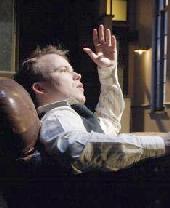SITE GUIDE
SEARCH
REVIEWS
FEATURES
NEWS
Etcetera and
Short Term Listings
LISTINGS
Broadway
Off-Broadway
NYC Restaurants
BOOKS and CDs
OTHER PLACES
Berkshires
London
California
New Jersey
DC
Philadelphia
Elsewhere
QUOTES
TKTS
PLAYWRIGHTS' ALBUMS
LETTERS TO EDITOR
FILM
LINKS
MISCELLANEOUS
Free Updates
Masthead
Writing for Us
A CurtainUp  London Review
London Review
 London Review
London ReviewPhilistines
|
I married a caterpillar hoping for a butterfly.
---- Elena
|

Rory Kinnear as Pyotr
(Photo: Catherine Ashmore) |
Set in a petit bourgeois household, Philistines concentrates on the generation in their twenties who were stifled by their parents. Gorky uses this household as metaphor for Russian society showing the way in which the old order is proving inadequate, unable to effectively reform from the medieval serfdom society which lasted until the late nineteenth century.
Tanya (Ruth Wilson) works as a school teacher and is so tired and bored and disappointed in love that she takes poison in the second act of the play. Her brother Pyotr (Rory Kinnear) was studying law until he was suspended from university because of his political agitation. He becomes obsessed with a young widow, Elena (Justine Mitchell). Their parents are awful. Phil Davies plays their father, Vassily, a petty bourgeois tyrant in his own home, dislikeable, corrupt, as unpleasant a character as you could hope to find. His wife Akulina (Stephanie Jacob) fusses around, busying herself on minor household things and ignoring the real problem looming with her daughter. This family has taken in lodgers to maintain their standard of living and these characters add to the social mix. There is Conleth Hill as Teterev, the boozy lodger who doubles as a fireside philosopher. Nil (Mark Bonnar) is the favoured foster son, idealistic and untainted by the ennui, whom Tanya has fallen for, but who instead courts the maid.
The performances are superb, as detailed and realistic as Gorky's naturalistic observation. Andrew Upton's new version is very accessible and although the content of the play is serious, there is plenty to laugh at. Pyotr at one point harangues the cupboard for just being there, a parallel with the speech in The Cherry Orchard. The lives portrayed are as boring as the relentless rain which pours down on the set windows throughout the play, dampening down any optimism which might once have been there. Nil describes life in this house as "a never ending Punch and Judy show", as we witness the hectoring, bullying father demanding obedience from his son, Pyotr. "Money is the master here" observes Nil and Teterev talks about suffering and desire which are all that raise people above the animals they basically are.
Howard Davies directs this play so that, although it is almost three hours long, it doesn't drag. The characters are involving but never sentimental, trapped as they are in their unhappiness. Bunny Christie's set shows the whole of the outside of the house but branches into one expansive floor with large windows showing the proximity of other houses and intrusive neighbours. Philistines is a brooding work designed to make us think about the hardship of human existence. But it isn't Chekhov.
|
PHILISTINES
Written by Maxim Gorky In a new version by Andrew Upton Directed by Howard Davies Starring: Rory Kinnear, Ruth Wilson, Phil Davis, Conleth Hill, Justine Mitchell, Mark Bonnar With: Susannah Fielding, Stephanie Jacob, Maggie McCarthy, Duncan Bell, Jonathan Bryan, Rendah Heywood, Marcus Cunningham, Mike Aherne, Julia West, Saskia Butler, Danny Nutt, Charlotte Pyke Design: Bunny Christie Lighting: Neil Austin Sound: Christopher Shutt Music: Dominic Muldowney Running time: Two hours 50 minutes with one interval Box Office: 020 7452 3000 Booking to 18th August 2007 Reviewed by Lizzie Loveridge based on 31st May 2007 performance at the Lyttelton Theatre, Royal National Theatre, South Bank, London SE1 (Rail/Tube: Waterloo) |
|
London Theatre Tickets Lion King Tickets Billy Elliot Tickets Mary Poppins Tickets Mamma Mia Tickets We Will Rock You Tickets Theatre Tickets |




